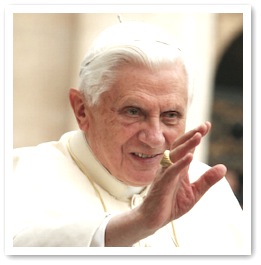The Pope Strikes Back
- THEODORE DALRYMPLE
It is a nice question as to whether a true or a false accusation provokes more outrage in the accused.
 So when, a few days before the Pope's late visit to this island, Cardinal Kasper said that arriving at Heathrow was like arriving in a Third World country, he was much excoriated by those who hate Cardinals as a matter of principle, and was immediately accused of racism, the accusation against which no defence is known.
So when, a few days before the Pope's late visit to this island, Cardinal Kasper said that arriving at Heathrow was like arriving in a Third World country, he was much excoriated by those who hate Cardinals as a matter of principle, and was immediately accused of racism, the accusation against which no defence is known.
Quite apart from the fact that the term Third World corresponds to no racial category, the all too swift resort to the accusation always puts me in mind of Lear's remark in Act IV:
Why dost thou lash that whore?
Strip thine own back.
Thou hotly lusts to use her in that kind
For which thou whip'st her.
In other words, the accusation of racism is often but a smokescreen for the accuser's own doubts.
It is obvious to all who know Heathrow that the Cardinal's remarks about our largest airport could have been interpreted in another way than racist: that its disorganisation, its atmosphere of always being on the verge of chaos or collapse to be brought about by one more passenger, its over-crowdedness, its sheer physical messiness, brings to mind the urbanisation of the Third World. Has anyone ever heard of people choosing to fly through Heathrow when an alternative presented itself, just because they liked the experience of Terminal Three? The very idea is absurd; the question answers itself; and while the tendency or ability to muddle through might be an admirable one in some circumstances, it certainly is not in the design of airports.
In other words, Cardinal Kasper's terrible crime was to be right, to draw attention to an unpleasant aspect of our reality from which we would rather avert our attention because we cannot face the effort, and no doubt the expense, that would be required to change it.
A great deal of the hostility to the Pope's visit was likewise caused by his having been right, at least in some things, such as the insufficiency of consumerist materialism as a basis for a satisfactory existence. There are few human types less attractive, surely, than failed materialists, which is what the British, or at least so many of them, now are. They consume without discrimination what they have not earned: which is why many of them are so grotesquely fat as well as so deeply indebted. Indeed, there is scarcely any kind of debt or deficit to which we as a nation have not resorted in order to continue (at least for a time) on our vulgar and degraded way. A nation that behaves thus is quite without honour or self-respect, collective or individual. All this Benedict XVI has seen with a perfectly clear eye; and if what George Orwell once wrote, that we have now sunk to a depth at which the restatement of the obvious is the first duty of intelligent men, we might even call the Pope the George Orwell of our time.
In other words, Benedict XVI presents not a challenge to this or that piece of social policy, but to a whole Weltanschauung. And hell hath no fury like a questionable Weltanschauung questioned.
Gratitude is seldom the reward of those who see an unwelcome truth more clearly than others; quite the reverse. But Benedict's 'crime,' apart from being German, goes much further than his failure (or worse his refusal) to screen out the unpleasant consequences of consumerist materialism from his vision, which it is the duty of all right-thinking people. He lays down a ethical challenge to our utilitarian ways of thinking; in other words, he is a heretic to be excommunicated from the Church of Righteous Liberalism.
In pointing out some of the fallacies, oversimplifications, dangers and empirically unfortunate results of contemporary rationalist utopianism, the Pope is potentially provocative of the kind of spiritual crisis that John Stuart Mill recounts in his Autobiography. When he was twenty, Mill, who had hitherto been trained as a kind of calculating machine for the felicific calculus, asked himself a question, with (for him) devastating results:
Suppose that all your objects in life were realized; that all the changes in institutions and opinions which you are looking forward to, could be erected this very instant: would this be a great joy and happiness to you? And an irrepressible self-consciousness answered 'No!'At this my heart sank within me; the whole foundation on which my life was constructed fell down. All my happiness was to have been founded in the continued pursuit of this end. The end had ceased to charm, and how could there ever again be any interest in the means? I seemed to have nothing left to live for.
In other words, Benedict XVI presents not a challenge to this or that piece of social policy, but to a whole Weltanschauung. And hell hath no fury like a questionable Weltanschauung questioned.
Here it is necessary for me to declare an interest, or rather lack of one. Just as one cannot write of the question of tobacco-control without declaring that one owns no shares in a tobacco company, so I must declare that I am not a Catholic, that I am not religious, that I am not therefore an apologist for the curia or anyone else. I am, in fact, not a systematic thinker at all, lacking the capacity or patience for it. And I disagree with the Pope on many things, but I do not therefore hate him.
The quite extravagant expressions of antagonism towards him – such, for example, as that consideration be given to arresting him for crimes against humanity – seem to me to bespeak a very odd, almost paranoid, state of mind. And while I hesitate always to use Freudian concepts, surely the idea of projection, the attribution to others of discreditable inclinations, thoughts or behaviour that one has oneself had or indulged in, is appropriate here.
As everyone knows, the Catholic Church has been embroiled in a scandal about the sexual abuse of children by priests and the religious. It is the Pope's supposed complaisance towards and responsibility for child abuse that has led people like Christopher Hitchens and Richard Dawkins to call for his arrest for crimes against humanity, under the doctrine of universal jurisdiction for such crimes. No one would say that the church has acted always with appropriate expedition in dealing with the problem.
Just as one cannot write of the question of tobacco-control without declaring that one owns no shares in a tobacco company, so I must declare that I am not a Catholic, that I am not religious, that I am not therefore an apologist for the curia or anyone else.
But the problem is not only, or even mainly, that of the church, quite the contrary. It is universally accepted that step-fathers, for example, are many times more likely to commit both physical and sexual abuse against children than biological fathers; and since step-fatherhood has now become a very much more common relationship than it once was, thanks to the social reforms of the last fifty years or so, it is likely that the great majority of child abuse that occurs in this country is committed by them. Moreover, it is a matter of common knowledge that many mothers connive at such abuse because they wish to retain the favours of the step-fathers.
It follows from this that, if the Pope should be arrested for crimes against humanity, so should the following categories:
+ Divorcees with children
+ Step-fathers
+ Single mothers
+ Feminists and all other proponents of lax marriage and easy divorce, including journalists
+ All legislators who have eased divorce laws and all government ministers who have either failed to support marriage by fiscal means or have actually weakened it by those means
+ All judges and other lawyers who have administered easy divorce laws instead of having refused to do so
+ All social workers and social security officials who have sought advantages for or administered payments to non-widowed single parents and no doubt many others.
I hope I need not say that I am not in favour of the arrest and trial of perhaps forty per cent of the population between the ages of twenty-five and sixty, or that I expect secular social 'liberals' either to arrest themselves or each other, but that they should does seem to follow from the argument of at least a few of their representatives. Indeed, the very resort of some liberals to the language of arrest shows how, not very far beneath a veneer of libertarianism, lies an authoritarianism that makes Benedict XVI look very liberal indeed. They want arguments to be settled by arrest: in other words, who can arrest whom, assuming that they will always be the ones to wield the handcuffs.
As is well known, Professor Dawkins has suggested that a religious upbringing should in itself be considered a form of child abuse, because in his view it is a form of child abuse; but he then drew back from the obvious inference that such an upbringing should be illegal. Of course, there are degrees of child abuse as of every other crime; but if a religious upbringing is not so abusive as to merit legal sanction, is it properly to be called child abuse at all, given the current connotations of that expression?
Given that so intelligent a man as Professor Dawkins, and others like him, were so clearly illogical on the matter of the Pope's visit, are we not entitled to suspect a deep emotional confusion within them: for example, one caused by a robust and unaccustomed challenge to a brittle Weltanschauung?
 This is Meaghen Gonzalez, Editor of CERC. I hope you appreciated this piece. We curate these articles especially for believers like you.
This is Meaghen Gonzalez, Editor of CERC. I hope you appreciated this piece. We curate these articles especially for believers like you.
Please show your appreciation by making a $3 donation. CERC is entirely reader supported.

Acknowledgement
 Theodore Dalrymple. "The Pope Strikes Back." The Salisbury Review (Winter, 2010).
Theodore Dalrymple. "The Pope Strikes Back." The Salisbury Review (Winter, 2010).
Reprinted with permission of the author, Theodore Dalrymple.
The Salisbury Review is "Britain's most intelligent conservative periodical".
The Author

 Theodore Dalrymple is a former psychiatrist and prison doctor. He lives in France and is the author of, The Terror of Existence: From Ecclesiastes to Theatre of the Absurd, The Proper Procedure and Other Stories, Out Into The Beautiful World, Admirable Evasions: How Psychology Undermines Morality, Spoilt Rotten: The Toxic Cult of Sentimentality, Farewell Fear, Our Culture, What's Left of It: The Mandarins and the Masses, Life at the Bottom: The Worldview That Makes the Underclass, and So Little Done.
Theodore Dalrymple is a former psychiatrist and prison doctor. He lives in France and is the author of, The Terror of Existence: From Ecclesiastes to Theatre of the Absurd, The Proper Procedure and Other Stories, Out Into The Beautiful World, Admirable Evasions: How Psychology Undermines Morality, Spoilt Rotten: The Toxic Cult of Sentimentality, Farewell Fear, Our Culture, What's Left of It: The Mandarins and the Masses, Life at the Bottom: The Worldview That Makes the Underclass, and So Little Done.




